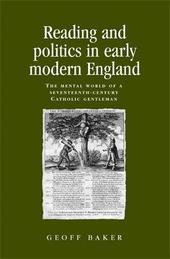
|
Reading and Politics in Early Modern England: The Mental World of a Seventeenth-Century Catholic Gentleman
Hardback
Main Details
| Title |
Reading and Politics in Early Modern England: The Mental World of a Seventeenth-Century Catholic Gentleman
|
| Authors and Contributors |
By (author) Geoff Baker
|
| Series | Politics, Culture and Society in Early Modern Britain |
|---|
| Physical Properties |
| Format:Hardback | | Pages:256 | | Dimensions(mm): Height 234,Width 156 |
|
| Category/Genre | British and Irish History |
|---|
| ISBN/Barcode |
9780719080241
|
| Classifications | Dewey:941.06 |
|---|
| Audience | |
|---|
| Illustrations |
Illustrations, black & white|Tables
|
|
Publishing Details |
| Publisher |
Manchester University Press
|
| Imprint |
Manchester University Press
|
| Publication Date |
30 March 2010 |
| Publication Country |
United Kingdom
|
Description
This book examines the activities of William Blundell, a seventeenth-century Catholic gentleman, and using the approaches of the history of reading provides a detailed analysis of his mindset. Blundell was neither the passive victim nor the entirely loyal subject that he and others have claimed. He actively defended his family from the penal laws and used the relative freedom that this gave him to patronise other Catholics. Not only did he rewrite the histories of recent civil conflicts to show that Protestants were prone to rebellion and Catholics to loyalty, but we also find a different perspective on his religious beliefs. Blundell's commonplaces suggest an underlying tension with aspects of Catholicism, a tension manifest throughout his notes on his practical engagement with the world, in which it is clear that he was wrestling with the various aspects of his identity. This is an important study that will be of interest to all who work on the early modern period. -- .
Author Biography
Geoff Baker is Senior Academic Advisor at the Centre for Integrative Learning, University of Nottingham -- .
Reviews'a gripping, sensitive, and insightful account of its subject, which manages at once to enhance and to challenge many ideas found within the existing canon of "recusant history".' Gabriel Glickman, Journal of British Studies, Vol. 51 No. 4 -- .
|